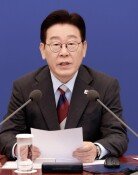Kim Jong Un's 'conditional denuclearization' remarks
Kim Jong Un's 'conditional denuclearization' remarks
Posted March. 29, 2018 08:12,
Updated March. 29, 2018 08:12
China's official Xinhua news agency on Wednesday quoted North Korean leader Kim Jong Un, who made a surprise visit to Beijing, as saying at a summit with Chinese President Xi Jinping, "The issue of denuclearization of the Korean Peninsula can be resolved, if South Korea and the United States respond to our efforts with goodwill, create an atmosphere of peace and stability while taking progressive and synchronous measures for the realization of peace." Kim also said, "It is our consistent stand to be committed to denuclearization on the peninsula, in accordance with the will of late President Kim Il Sung and late General Secretary Kim Jong Il." In a response, Xi noted that Beijing "sticks to the goal of denuclearization of the peninsula, safeguarding peace and stability on the peninsula and solving problems through dialogue and consultation."
Kim Jong Un's remarks at the summit are a reaffirmation of the previous expression of his will to denuclearize the North during a meeting in Pyongyang with special envoys of South Korean President Moon Jae-in early this month. The remarks are in line with the special envoys' announcement of the result of their visit to Pyongyang in which they said that North Korea "clearly affirmed its commitment to the denuclearization of the Korean Peninsula and said it would have no reason to possess nuclear weapons should the safety of its regime be guaranteed and military threats against North Korea removed." Kim also reiterated that denuclearization of the peninsula is the will of the late North Korean leaders. However, what attracts greater attention is that he made it clearer that the proposed denuclearization is conditional by saying that Seoul and Washington should take "progressive and synchronous measures." Although he did not elaborate on the conditions, they will probably involve a guarantee of the North Korean regime, the signing of a peace treaty and the normalization of the Pyongyang-Washington relationship.
After all, Kim's idea is that the North's denuclearization should be compensated with corresponding measures, including easing sanctions on the North, at every step of the process from a nuclear freeze to dismantlement. No one would have thought that Kim would implement unconditional denuclearization. However, he has made it clear that he would not do it for free. That is generally in the same vein as China's proposal of seeking "dual progress" and Seoul's idea for peacemaking on the peninsula.
Still, it is true that such approaches are quite different from the United States' position. Washington has repeatedly said that its goal was to achieve a "complete, verifiable and irreversible dismantlement" and that it would continue to impose sanctions and putting pressures on Pyongyang until the denuclearization is achieved. In other words, Washington's idea is to give compensations after Pyongyang denuclearizes itself first. The White House said U.S. President Donald Trump was following the latest trends involving North Korea. But it is questionable whether Trump accepted Kim's proposal of a summit with sufficient knowledge about Kim's way of denuclearization.
After all, the key lies in whether the United States will agree to the goal of simultaneously competing denuclearization and establishing a peace regime. Even if it does, denuclearization has to go through the extremely difficult process of a freeze, disablement, reports and inspections. It is unclear whether Washington will respond to Pyongyang's demand of a security guarantee, eased sanctions and economic assistance every step of the way.
It is likely that Kim will demand U.S. reaffirmation of the "four no's" principle – that the United States does not seek a regime change or its collapse, an accelerated reunification, nor an excuse to send its military north of the 38th parallel – as a starting point for the North Korea-U.S. dialogue. However, the doves who took the "four no's" initiatives in the Trump administration are gone and replaced by ultra-hardline hawks. It could be rash to become pessimistic even before Pyongyang and Washington lay out their conditions. Still, it has become clear that there are so many hurdles to overcome before an agreement is reached. It is time to remember how significant the inter-Korean summit is and how important it is to have policy coordination between Seoul and Washington.



![아침 공복 따뜻한 물 한 잔, 정말 살 빠지고 해독될까?[건강팩트체크]](https://dimg.donga.com/c/138/175/90/1/wps/NEWS/IMAGE/2026/03/05/133467930.3.jpg)



